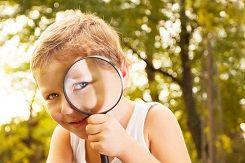Science learning in the early years has little to do with the periodic table and petri dishes, but everything to do with asking questions, curiosity, trial and error, and discovery. As Ms. Frizzle from the beloved animated show, “Magic School Bus” liked to say, “Take chances, make mistakes, get messy!”
But what does that look like at home? And how does it happen in the midst of making meals, paying bills, and answering emails—in other words, real life?
Cultivate an “I wonder” attitude to life. Encourage your child’s questions. These questions foster curiosity and support a quest for knowledge by allowing your child to seek answers to different types of experiences.
Boosting Scientific Thinking with Questions
When your child asks a probing question, it is tempting to jump to answer it. Instead of giving the direct answer, try to respond with a question to encourage reasoning and prediction:
- What do you think?
- Tell me about it?
- How would you describe…?
- What does it look/feel/smell/taste/sound like?
- What do you think happened? How?
- How can we find out?
Experimenting at Home
Try these ideas to explore at home with your child, keeping in mind that trial and error and allowing opportunities to make mistakes are key elements to building a scientific mind.
- Adopt one specific tree in your neighborhood or yard, and observe the changes it goes through during each season.
- Make a “calendar of firsts,” which is simply a calendar upon which you note first things in each season, e.g., first red leaf of autumn, first snowfall, or first bird sighting in the spring.
- Make a study of light and shadows. Use a flashlight and your hands to make shadows on your child’s bedroom wall one night. Observe how the wall color looks different depending on the time of day. Observe how your shadows are longer or shorter depending on the time of day and season. Challenge your child to adjust the length or size of shadow. You can even do a version of this experience with infants!
- Baking a cake is the perfect way to allow and encourage mistakes. When baking, create a comparison recipe that omits one of the key ingredients and observe and discuss the differences.
- Allow your child to use materials such as glue, tape, paint, water, and more, with as much independence as possible. By hands-on use of these, your child will learn how much is too much, or just right. Learning to navigate materials is an integral part of scientific discovery and can only be learned by trial and error.
- Reinforce to your child that each mistake is an opportunity. After all, many inventions were developed on the path to investigating something completely different or by accident—such as sticky notes and popsicles!
Reading Books about Science
Reading books about STEM opens the door to scientific discoveries that may not be immediately obvious or observable in your everyday experiences. Here are a few suggestions:
- Look for birds’ nests after reading “A Nest is Noisy” by Diana Hutts Aston
- Read “Roxaboxen” by Alice McLerran and then create your own miniature town
- Go on a fractal hunt after reading Sarah C. Campbell’s “Mysterious Patterns: Finding Fractals in Nature”
Picture books can also be used to delve deeper into an existing interest or to answer all those “I wonder” questions that have you stumped.
Exploring Science within Your Community
Today’s emphasis on science means that on any given day or weekend, there are probably multiple STEM programs and classes in your community. These can be wonderful family experiences, but they shouldn’t come at the expense of your relationships or your peace. Maybe one weekend, you’ll take part in a class or visit a museum. Another weekend, you’ll go on a nature walk or hike.
And at the end of a particularly hectic week, maybe what your family really needs is to spend time at home doing nothing at all…and that’s okay! Read some books, sit on the porch swing, and turn over rocks for bugs. These slow times are every bit as enriching as structured activities—and they’re often the experiences that children remember later.
Remember: you don’t need special equipment and you don’t need to carve out hours of time. The most vital part of science learning in the early years is helping children develop a sense of wonder in the world.
Source: https://www.brighthorizons.com/










